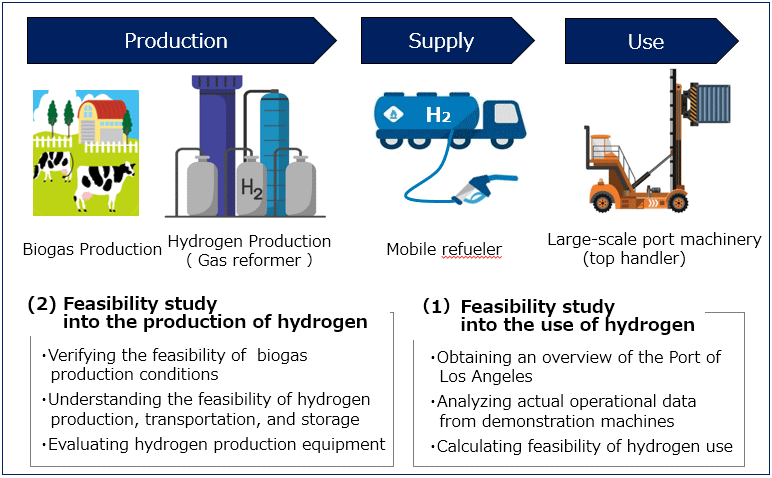Toyota Tsusho to Conduct Feasibility Study into Local Production for Local Consumption of Hydrogen
- Seeking to use fuel cells to large-scale machinery at the Port of Los Angeles -
- (former)other
2020-10-14
Toyota Tsusho Corporation ("Toyota Tsusho") and Toyota Tsusho America, Inc. ("TAI") have been selected by the New Energy and Industrial Technology Development Organization ("NEDO") to take part in a research project entitled "An investigation into the potential production and use of hydrogen based on a local production for local consumption model." To this end, in September 2020 the two companies commenced feasibility studies ("the project") into the use of hydrogen fuel cells ("FC") to power port machinery, and into the local production for local consumption of hydrogen. The project is taking place at the Port of Los Angeles in California, U.S.A.
1. Background
The Port of Los Angeles has stated a goal to achieve zero emissions from port machinery by 2030. Progress has been made in the electrification of small machinery such as forklifts and of fixed equipment; however, it has proven more difficult for large-scale mobile machinery that requires high electric output, such as top handlers, due to constraints on operating hours and charging infrastructure.
The establishment of a model that utilizes hydrogen FC is regarded as a promising alternative to existing diesel-powered machinery, since it would enable both continuous operation for required shift hours, quick refueling during short downtime, and would not require the establishment of large-scale infrastructure.
2. Overview of the Project
Toyota Tsusho has thus far taken part in a variety of projects aimed at demonstrating the feasibility of hydrogen production and use. Leveraging the expertise it has gained thereby, the company will carry out two feasibility studies at the Port of Los Angeles and in its vicinity in conjunction with TAI: 1. A feasibility study into the use of hydrogen to power large-scale port machinery with FC and it hydrogen supply scheme; and 2. A feasibility study into the production of hydrogen from biogases derived from livestock manure.
Through these two studies, Toyota Tsusho will seek to determine whether it is possible to establish a local production for local consumption model that covers hydrogen production, storage, transportation, and use, with the aim of powering large-scale port machinery with FC. The project is scheduled to take place from September 2020 to March 2022.
(1) Feasibility study into the use of hydrogen
A variety of large-scale port machinery, the electrification of which has proven difficult, is in use at the Port of Los Angeles and in its vicinity. Toyota Tsusho will investigate the number of operational units, their operating conditions, fuel consumption, and refueling methods, and the volume of their CO2 and other air pollutant emissions. In addition, the company will collect and analyze operational data on FC-powered top handlers and mobile ultrahigh pressure hydrogen refueler—which are being newly developed by TAI—in actual use environments, and compare their safety and operational performance to existing diesel-powered machinery.
(2) Feasibility study into the production of hydrogen
Toyota Tsusho will study how much hydrogen can be produced from biogases derived from livestock manure, and investigate what facilities will be required, the costs, and supply methods in the central California, Central Valley. In addition, the company will evaluate the performance and equipment configuration of gas reforming-based hydrogen production systems around the Port of Los Angeles, and investigate the applicability of other Japanese technologies and equipment.
Based on the results of these studies, Toyota Tsusho will verify the possibility and feasibility of hydrogen use for large-scale machines in Japan, which battery dominant electrification has been proven to be challenging and problematic.
Toyota Tsusho has defined as one of its Key Sustainability Issues (Materiality): “Contribute to the transition to a low-carbon society by reducing automotive, manufacturing, and energy plant construction CO2 emissions through the use of clean energy and innovative technologies.” Going forward, through the use of renewable energies and through the effective use of unused resources both in Japan and overseas, Toyota Tsusho intends to contribute to the realization of low-carbon societies with minimal environmental footprints.
Feasibility study into a local production for local consumption model of hydrogen

The information in this release is current as of the date of announcement.
Please note that information may change after the date of announcement. Thank you in advance for your understanding.



